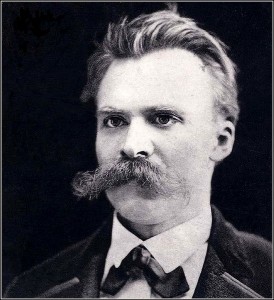Before he shot himself in the head on the campus of Harvard University on a pleasant September day in 2010, Mitchell Heisman penned the longest suicide note in history. The 1,900-page tome detailed the specific philosophical reasons he couldn’t carry on, including 1,433 footnotes and a 20-page bibliography with a particular fixation on the stark world-view of German philosopher Friedrich Nietzsche.
Nietzsche as existential enthusiasts know was a father of nihilism and coined the phrase “God is dead” in reaction to what he believed was the empty hypocrisy of religious institutions.  Heisman crawled a long way down the nihilist rabbit hole, spending 12 hours a day over a period of several years beavering away on his bleak terminus opus.
Heisman crawled a long way down the nihilist rabbit hole, spending 12 hours a day over a period of several years beavering away on his bleak terminus opus.
When he finally felt he has adequately described the many reasons that life was utterly pointless, Heisman was uncharacteristically perky. He spent days preceding blowing his brains out cheerfully stuffing envelopes with CD copies of his dissertation and arranging hundreds more to be automatically emailed after his death. For maximum ironic effect he dressed for the occasion in white tuxedo and chose Yom Kippur, the holiest day of his faith, to end his existence.
Perhaps Heisman envisioned that others would pour through almost 2,000 unedited pages of philosophical pessimism and realize they should end it all as well – multitudes around the world putting down his carefully considered treatise and picking up a handgun in suicidal celebration of life’s futility.
While Heisman’s entire work is available for free online it has not generated much online buzz other than a satirical entry in the Encyclopedia Dramatica. The strange case of Heisman is an extreme example of how philosophical ennui can be fatal, and routinely is. Humans are among the only animals that regularly decide to end their existence – our magnificent brain turning the frightening power of deductive reasoning in on itself like an imploding star.
Those seeking to merely deaden the unnerving experience of existence drive a multibillion industry of various brain addling agents. According to the UN, people around the world collectively pound back about 30 billion litres of pure alcohol every year. That works out to over 330 billion bottles of wine or enough beer to fill almost a 200,000 Olympic swimming pools. Prefer the hard stuff? Humans guzzle the equivalent of over 100 billion bottles of hooch. The proportion of drinkers goes way up in richer countries, where an adult typically consumes about 100 bottles of wine every year.
Booze is bad for you but that rarely stops someone from having a drink. About 3.3 million people die from alcohol-related causes but consumption is climbing worldwide. No one seems to have hard numbers on how much money we spend getting shit-faced so I have helpfully done the math for you. Assuming you can choke down the cheap stuff, 330 billion bottles of wine might conservatively go for $5 apiece meaning people the world over shell out almost $2 trillion each year avoiding reality while slowly killing themselves.
Antidepressants are another depressing measure of our collective spiritual health. Thirty million Americans, or one-in-ten are now taking medications cope with melancholy. Among middle aged women that proportion skyrockets to one in four. Americans spend $280 billion on prescription drugs every year.
Most people wouldn’t consider movies or television a vice but isn’t the whole point to be taken out of your present moment? The average person in North America zones out to 5 hours of TV every day or about nine years worth over the course of their lifetime, including two entire years watching commercials. The TV industry spends over $125 billion each year – up two thirds from ten years ago. Making movies eats up another $88 billion annually meaning that North Americans fork over $200 billion every year to tune out from their own lives.
Video games are another source of refuge from the miraculous, traumatic and exhausting state of being alive. Two thirds of American households indulge on average eight hours per week with total sales in 2014 topping $22 billion.
Obviously humanity is in need of a spiritual overhaul. Is being alive really so pointless? Rather than coping your way towards an inconsequential death, what if your existence as a cosmic observer was instead the only thing that actually made reality real? Our unfolding knowledge of physics hints that your attention to creation is the one thing that can make it come to life.
In spite of the teaming thongs of humanity leading many to wonder if they have any significance, sentience in the universe seems exceedingly rare. It may only exist on this fragile planet. If perception is our cosmic superpower, what kind of moral responsibility would we then have?